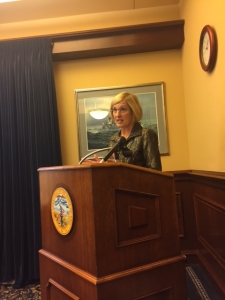
The state Department of Justice and Department of Corrections need more money from the legislature’s budget in the upcoming year, at least that was the center of discussion at the first meeting of the Governor’s Working Group on Justice Policy Reform. The group of state leaders met at the capitol on Thursday in what is part of a series of public meetings meant to discuss and come up with policy suggestions for the state’s criminal justice programs.
Several stakeholders shared their position of the current state of the system, including Lettie Prell with the DOC. She first outlined some positive news about the drug courts across the state.
“State wide for the last two years, there has been no statistically significant difference in recidivism rates for African-American offenders in Iowa compared to whites, and that is not the data you will see nationally,” said Prell. “Nationally, there are disparate recidivism rates of African-Americans compared with whites.”
Prell also praised the success of new alternative programs in Waterloo and Des Moines that keep drug offenders off the streets by incorporating the community into the rehabilitation process.
“They provide intensive supervision and lower case sizes, culturally responsive programming, cultural awareness training for the staff that supervise the offenders, and just better environments for staff to work in,” said Prell. “They each have made unique decisions in involving the larger community. In Waterloo, there’s mentoring from the community to offenders. In Des Moines, they’ve involved the family as a change agent to assist the offender be successful.”
Funding, however, remains an issue, said Prell. She said they are extremely expensive to operate, and federal grant money has run out.
“The state sometimes has to choose in their budget whether to give more money to education, and then they have they decision whether to fund drug courts,” said Prell. “But are they willing to give more? That’s what we need.”
Ottumwa defense attorney Joe Goedken echoed Prell’s funding concerns in his presentation to the group.
“Our biggest costs are staff and paying for services that aren’t covered under insurance,” said Goedken. “Our model used to be healthy. It’s not right now. We are the ones who are running on half a tank.”
Ottumwa’s drug court was almost shutting its doors in the past few months, but managed to receive money from the state. It did, however, have to reduce its staff size. Goedken emphasized that though the drug court is costly, the return on investment is substantial to the taxpayer and state.
“The drug court participants are different in that they’re required to pay off all their fines, fees, restitution, etc,” said Goedken. “A lot of people, that stuff goes to collections and is never paid, they never have a license, they never own a car. There’s a return on this investment.”
Goedken also outlined that drug courts are worth the extra expense to the state because of the people they serve.
“It is a unique group of people that are held accountable by the system and actually pay their way,” said Goedken. “In fact, they pay for their hair tests when it gets sent in every three months. They pay for that out of pocket, 55 bucks.”
The group was also joined by a large turnout at the capitol, and many people commented on the prison system as a whole and that it is not for every type of offender. Policy changes and suggestions will be brought to the legislature in mid-November. The group has three more public comment meetings.





